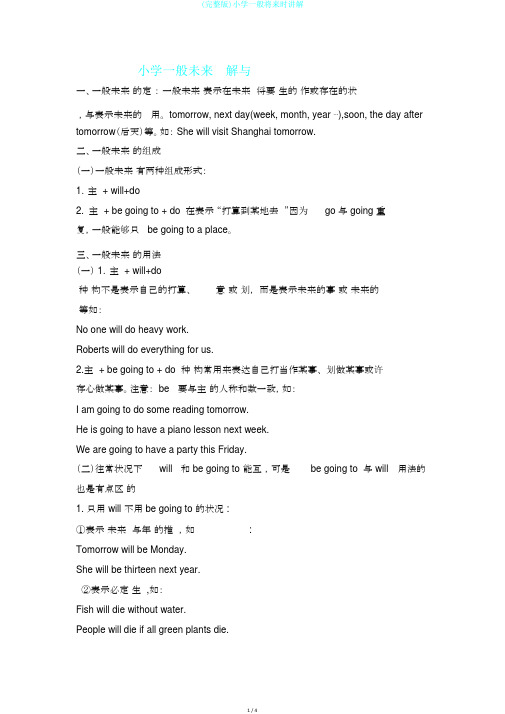小学英语毕业总复习 时态专题考点讲解:一般将来时
小学毕业英语总复习时态精析第四节一般将来时课件

续表
句型
结构
举例
否定句
主语+will not (won't)+ 动词原形+其 他.
I will not(won't)climb the mountain this week. 这周我不会 去爬山。
We will learn lots of new words this term. 这学期我们将会学很多新单词。 →What will you learn this term? 这 学期你们将会学什么?
【注】will 没有人称和数的变化。will结构多用于表 示客观上将要发生的事情,但很多情况下可与be going to结构互换使用。
3. A: ___Is__sh_e__g_o_in__g_t_o_c_o_o_k__d_in_n__er_?____________ B: Yes,she is going to cook dinner.
4. A: __W__h_e_r_e_a_r_e_y_o_u__g_o_i_n_g_?_________________
Lind A: No, I'm not. I have an art lesson this afternoon. A.Are; swim B.Will; swim C.Are; swimming
( C )5.We are going to cook some fish __________.
A.now
考点精析
考点 考查一般将来时的用法 【例】Read and fill. 用括号内所给单词的适当形式填空。 1.Jack __________ (draw) a birthday cake on the board before the party tomorrow afternoon. 2.The girls __________ (dance) for us at the party tomorrow evening.
小学英语六年级一般将来时复习-PPT课件

我正在进行体育运动。
选出填空。 what when where who how
1._W__h_a_t are you going to do? I am going to do my homework.
2. W__h_e_n__are you going? I am going at 3:00. 3._H_o_w___ are you going? I am going buy bus. 4._W_h_o___ are you going with?
1. What (询问活动) 例: What are you going to do tonight?
今晚你打算干什么? I am going to the cinema.
我打算去看电影。
2. Where(询问地点) 例: Where are you going this evening?
今天晚上你打算去哪里? I am going to the bookstore. 我打算去书店。
3.一般疑问句:Be+主语+going to+动词原形+将
来时间?
例:Are they going to read a book tonight ?
4. 将来时态的特殊疑问句:
句型:疑问词+be动词+主语
+going to+动词原形+将来时 间?
将来时态的特殊疑问句:
句型:疑问词+be动词+主语+going to+动词原形+将来 时间?
小学英语六年级一般将来 时复习-PPT课件
(完整版)小学一般将来时讲解

小学一般未来解与一、一般未来的定:一般未来表示在未来将要生的作或存在的状,与表示未来的用。
tomorrow, next day(week, month, year ⋯),soon, the day after tomorrow(后天)等。
如: She will visit Shanghai tomorrow.二、一般未来的组成(一)一般未来有两种组成形式:1.主 + will+do2.主 + be going to + do 在表示“打算到某地去”因为 go 与 going 重复,一般能够只 be going to a place。
三、一般未来的用法(一) 1.主 + will+do种构不是表示自己的打算、意或划,而是表示未来的事或未来的等如:No one will do heavy work.Roberts will do everything for us.2.主 + be going to + do 种构常用来表达自己打当作某事、划做某事或许存心做某事。
注意: be 要与主的人称和数一致,如:I am going to do some reading tomorrow.He is going to have a piano lesson next week.We are going to have a party this Friday.(二)往常状况下will和be going to能互,可是be going to 与 will用法的也是有点区的1. 只用 will 不用 be going to 的状况 :①表示未来与年的推,如:Tomorrow will be Monday.She will be thirteen next year.②表示必定生 ,如:Fish will die without water.People will die if all green plants die.2.只用 be going to 而不用 will 的状况:假如表示已有迹象表示在不久的未来要发生的事情时,如:Look at those black clouds, It’ s going to rain.(三)某些动词如: go/come/leave/start/begin/arrive等,它们的此刻进行时能够表示未来时,如:They are leaving for Shanghaitomorrow.My brother is coming here soon.四、一般未来时的句式变换一定句:主语 + will+do主语 + be going to + do否认句:主语 + will+not+do (will not可缩写成won’t)主语 + be+ not+ going to +do一般疑问句:will+ 主语 + dobe+主语 +going to+do特别疑问句:疑问词 + will+ 主语 +do疑问词 +be+主语 +going to+do五.稳固练习一、按要求填空1.我打算明日和朋友去野炊。
小学一般将来时讲解

小学一般将来时讲解1. 介绍小学一般将来时是英语语法中的一种时态,用来表示将来发生的行动或事件。
在这种时态中,动作与时间的关系是相对的,即动作将在将来某一时刻发生。
2. 构成小学一般将来时由情态动词 "will" 或 "shall" 加上动词原形构成。
下面是一些例子:- I will go to school.- She will play basketball.- We shall see a movie.3. 肯定句结构小学一般将来时的肯定句结构是:主语 + will/shall + 动词原形+ 其他。
4. 否定句结构小学一般将来时的否定句结构是:主语 + will/shall + not + 动词原形 + 其他。
5. 疑问句结构小学一般将来时的疑问句结构是:Will/Shall + 主语 + 动词原形+ 其他?6. 使用场景小学一般将来时常用于以下场景:- 表示未来的计划或打算:I will go to the park tomorrow.- 表示预测:It will rain later.- 表示意愿或请求:Will you help me with my homework?7. 注意事项在小学一般将来时中,我们要注意以下几点:- 不使用"will"或"shall"来表达对他人的承诺或决定,如"I promise"或"I decide"。
- 在口语中,经常使用"will"而不是"shall"。
- 在第一人称疑问句中,我们可以使用"shall"代替"will",但这并不常见。
希望这份文档对你的小学一般将来时的学习有所帮助!。
一般将来时态精讲

一般将来时态精讲TPMK standardization office TPMK5AB- TPMK08- TPMK2C- TPMK18一般将来时态精讲(一)一般将来时(de)定义一般将来时表示将来某个时间所发生动(de)作或存在(de)状态,也可表示将来经常或反复发生(de)动作,经常与表示将来(de)时间状语连用, 如:soon, tomorrow,next week, in a few days等.例如:Where will you be this time tomorrow 明天这个时候你会在那儿1. 表示将要发生(de)动作或存在(de)状态.例如:I will return the book in a few days. 我过几天会还这本书.2. 表示将来经常或反复发生(de)动作.例如:They will go to the park every Sunday. 他们将每周日去公园.(二)一般将来时(de)构成一般将来时由“助动词shall/will+动词原形”构成.系动词am, is, are都用动词原形be.1. shall用于第一人称后表示一般将来时,一般只限于肯定句和否定句中.shall通常用于第一人称后,由其构成(de)一般疑问句用来询问对方(de)意见,这时(de)shall不含将来含义,也不可被will替代.例如:There’s no one to answer the phone. What shall we do 没有人接,我们该怎么办2.美国英语中,不论什么人称和数,一律用“will+动词原形”.在口语中,will常缩写为’ll,与主语连写在一起.如:I’ll, you’ll, he’ll, she’ll, we’ll, they’ll;而shall not常缩写为shan’t,will not常缩写为won’t.(三)一般将来时(de)结构1. 肯定句:主语+shall\will+动词原形.I shall\will work next year. 明年我将要工作了.2. 否定句:主语+shall\ will+not+动词原形.I won’t tell anyone what you said. 你说(de)话我不会告诉任何人.3. 一般疑问句:Shall\Will+主语+动词原形—Will you leave for Beijing next week 下周你将前往北京吗—Yes, I will. 是(de),我将要去. No, I won’t. 不,我不去.4. 特殊疑问句“特殊疑问词+一般疑问句”(de)语序,也就是“疑问词+will+主语+动词原形+其他成分”.如果是对主语提问,则主语就不在句子中出现.例如:Who will leave for Beijing next week 下周谁将前往北京(四)There be 句型(de)一般将来时There be 句型(de)一般将来时There will be表示“将来有……”.1. 肯定句:There will be+ 物+ 介词短语+其他.例如:There will be cars in people’s home in the future..将来人们(de)家里会很多(de)小汽车.2. 否定句:There won’t be + 物+介词短语+ 其他.例如:There won’t be any trees in this place in two years.两年后这个地方就不会有树了.3. 疑问句:Will there be +物+介词短语+其他例如:—Will there be less pollution 将来会有更少(de)污染吗—Yes, there will.是(de),会(de).—No, there won’t. 不,不会.(五)be going to 表示将来1.用来表示按计划或安排要发生(de)动作We are going to have a class meeting this afternoon.今天下午我们打算开班会.2.表示推测将要或肯定会发生(de)动作,有“准备;打算”(de)意思.含有be going to 结构(de)句子中往往有表示将来(de)时间状语.例如:Look at the black clouds. It's going to rain.看那些乌云,快要下雨了.结构:肯定句:主语 + be(am,is,are) + going to do sth.否定句:主语 + be(am,is,are)+ not + going to do sth.疑问句:Be(am,is,are)+ 主语 + going to do sthYes, 主语+ am/is/are. / No, 主语+ isn't/aren't. / No, I'm not. They are going to see the car factory next week. (肯定句) They are not going to see the car factory next week. (否定句)-Are they going to see the car factory next week-Yes, they are. (No, they aren't.) (一般疑问句及其回答)注意:There is / are going to be... (注意句型中going to 后面(de)be不能改为have.) 常用来表示将有某事发生.例如:There is going to be a football match next Saturday in our school.下周六我们学校将有一场足球比赛.(六)come, go, leave, arrive,take等表示位置移动(de)动词常用现在进行时表示将要发生(de)动作,它们很少与be going to 结构连用.例如:Miss Sun is coming tonight.今晚孙小姐要来.(七)be going to 和will(de)区别1.will表示说话人认为、相信、希望或假定要发生(de)事,不含任何具体(de)时间,可以指遥远(de)将来;而be going to 指有迹象表明某事即将发生或肯定发生,通常指很快就要发生(de)事情.2. be gong to 和will均可表示意图,但事先考虑过(de)意图用be going to,不是事先考虑过(de)意图用will.一般将来时练习一、单项选择( ) 1. There __________ a meeting tomorrow afternoon.A. will be going toB. will going to beC. is going to beD. will go to be( ) 2. Charlie ________ here next month.A. isn’t workingB. doesn’t workingC. isn’t going toworking D. won’t work( ) 3. He ________ very busy this week, he ________ free next week.A. will be; isB. is; isC. will be; will beD. is;will be( ) 4. There ________ a dolphin show in the zoo tomorrow evening.A. wasB. is going to haveC. will haveD.is going to be( ) 5. –________ you ________ free tomorrow – No. I ________ free the day aftertomorrow.A. Are; going to; willB. Are; going to be; willC. Are; going to; will beD. Are; going to be; will be( ) 6. Mother ________ me a nice present on my next birthday.A. will givesB. will giveC. givesD.give( ) 7. – Shall I buy a cup of tea for you –________. (不,不要.)A. No, you won’t.B. No, you aren’t.C. No, please don’t.D. No, please.( ) 8. – Where is the morning paper – I ________ it for youat once.A. getB. am gettingC. to getD. will get ( ) 9. ________ a concert next SaturdayA. There will beB. Will there beC. There can beD. There are( ) 10. If they come, we ________ a meeting.A. haveB. will haveC. hadD. would have( ) 11. He ________ her a beautiful hat on her next birthday.A. givesB. gaveC. will givingD. isgoing to give( ) 12. He ________ to us as soon as he gets there.A. writesB. has writtenC. will writeD. wrote( ) 13. He ________ in three days.A. coming backB. came backC. will come backD. isgoing to coming back( ) 14. If it ________ tomorrow, we’ll go roller-skating.A. isn’t rainB. won’t rainC. doesn’t rainD. doesn’t fine( ) 15. – Will his parents go to see the Terra Cotta Warriorstomorrow– No, ________ (不去).A. they willn’t.B. they won’t.C. they aren’t.D. they don’t.( ) 16. Who ________ we ________ swimming with tomorrow afternoonA. will; goB. do; goC. will; goingD. shall;go( ) 17. We ________ the work this way next time.A. doB. will doC. going to doD. will doing( ) 18. Tomorrow he ________ a kite in the open air first, and then________ boating in thepark.A. will fly; will goB. will fly; goesC. is going to fly;will goes D. flies; will go( ) 19. The day after tomorrow they ________ a volleyball match.A. will watchingB. watchesC. is watchingD. is going to watch( ) 20. There ________ a birthday party this Sunday.A. shall beB. will beC. shall going to beD. will going to be( ) 21. They ________ an English evening next Sunday.A. are havingB. are going to haveC. will havingD. is going to have( ) 22. ________ you ________ free next SundayA. Will; areB. Will; beC. Do; beD. Are; be( ) 23. He ________ there at ten tomorrow morning.A. willB. isC. will beD. be( ) 24. ________ your brother ________ a magazine from the libraryA. Are; going to borrowB. Is; going to borrowC. Will; borrowsD. Are; going to borrows( ) 25. – Shall I come again tomorrow afternoon –________ (好(de)).A. Yes, pleaseB. Yes, you will.C. No, please.D. No, you won’t.( ) 26. It ________ the year of the horse next year.A. is going to beB. is going toC. will beD. will is( ) 27. ________ open the windowA. Will you pleaseB. Please will youC. You pleaseD. Do you( ) 28. –Let’s go out to play football, shall we – OK. I________.A. will comingB. be going to comeC. comeD. am coming( ) 29. It ________ us a long time to learn English well.A. takesB. will takeC. spendsD. will spend ( ) 30. The train ____ at 11.A. going to arriveB. will be arriveC. is going toD. is arriving二、动词填空1. I ______(leave)in a minute. I ______(finish)all my work before I ______ (leave).2. —How long _____ you _____(study)in our country—I _____(plan)to be here for about one more year.—I _____(hope)to visit the other parts of your country.—What ______ you ______(do)after you ______(leave)here—I ______(return)home and ______(get)a job.3. I ______(be)tired. I ___________(go)to bed early tonight.4. Mary’s birthday is next Monday, her mother __________(give)her a present.5. It is very cold these days. It ___________(snow)soon.6. —_____ you _____(be)here this Saturday —No. I ___________(visit)my teacher.7. —______ I ______(get)you a copy of today’s newspaper —Thank you.8. I am afraid there ______(be)a meeting this afternoon. I can’t join you.9. Mike ___________( not , believe)this until he ______(see)it with his own eyes.10. Most of us don’t think their team ______(win).三、句型转换.1. People in the north often go skating in winter. (next winter)________________________________________________________________________ ______2.There are two cinemas in that town. (next year)________________________________________________________________________ ______3.He comes back late.(in two days)________________________________________________________________________ ______4.She is a conductor of a train.(soon)________________________________________________________________________ ______5.Li Ming is ten years old.(next year)________________________________________________________________________ ______6.I sometimes write to my mother in the evening.(tonight)________________________________________________________________________ ______7.He went there by plane.(some day next year)________________________________________________________________________ ______8.China is a modern and strong country.(in twenty years)________________________________________________________________________ ______9.Do you study hard(from now on)________________________________________________________________________ ______10.She didn’t speak English at the meeting.(before long)________________________________________________________________________ ______。
小学英语语法时态一般将来时详解

小学英语语法时态一般将来时详解一、概念一般将来时表示将来某一时刻的动作或状态;或将来某一段时间内经常的动作或状态..一般将来时由助动词shall第一人称;will第二、三人称+动词原形构成..美国英语则不管什么人称;一律用will..二、一般将来时的形式●will 常简略为'll;并与主语连写在一起;如:I'll;he'll;it'll;we'll;you'll;they'll..●一般疑问句如用Will you…其简略答语须是Yes;I will或 No;I will not;如用 Shall you…较少见其简略答语须是 Yes;I shall.或 No; I shall not...三、一般将来时的用法1表示将来的动作或状态一般将来时常与一些表示将来的时间状语连用;如:tomorrow明天; next week 下周; from now on从现在开始;in the future将来等..2表示将来经常发生的动作..一般将来时表示将来某一时刻的动作或状态;其表达形式除了“shall第一人称;will第二、三人称+动词原形构成”外;还有以下几种形式..1“to be going to+动词原形”表示即将发生的或最近打算进行的事..例如:①It is going to rain. 要下雨了.. ②We are going to have a meeting today. 今天我们开会..2go;come;start;move;sail;leave;arrive;stay等可用进行时态表示按计划即将发生的动作;例如: I'm leaving for Beijing. 我要去北京..3“be to+动词原形”表示按计划要发生的事或征求对方意见..例如:①Are we to go on with this work 我们继续干吗②The boy is to go to school tomorrow.这个男孩明天要去上学..4“be about to+动词原形”表示即将发生的动作;意为:很快;马上..后面一般不跟时间状语..例如: We are about to leave.我们马上就走..5某些词;如come; go; leave; arrive; start; get; stay 等的一般现在时也可表示将来..①The meeting starts at five o'clock.会议五点开始..②He gets off at the next stop.他下一站下车四、一般将来时特点1shall用于第一人称;常被will 所代替..will 在陈述句中用于各人称;在征求意见时常用于第二人称..Which paragraph shall I read first Will you be at home at seven this evening2be going to +不定式;表示将来..a. 主语的意图;即将做某事..What are you going to do tomorrowb. 计划;安排要发生的事..The play is going to be produced next month..c. 有迹象要发生的事Look at the dark clouds; there is going to be a storm.3be +不定式表将来;按计划或正式安排将发生的事.. We are to discuss the report next Saturday.4be about to +不定式;意为马上做某事.. He is about to leave for Beijing.注意:be about to 不能与tomorrow; next week 等表示明确将来时的时间状语连用..五、一般将来时常见用法1、表示将要发生的动作..例如:I shall go to see a friend this evening.2、shall用于第一人称作主语的问句里;表示征求对方的意见或询问情况..例如:Shall I open the door3、will用于第二人称的问句里;征求对方是否愿意或表示客气的邀请或命令..例如:Will you please read the word4、be going to打算、准备做某事或即将发生的事..例如:We are going to plant trees.这种时态由be的将来时形式+现在分词构成..如主语为第一人称;除在疑问句外will要比shall更常用.可用做一般进行时;也可表示不含意图又未发生的动作..5、be to do按计划安排要发生的事或征求对方意见..例如:When is the swimming pool to open6、be going在go;come;leave;stay等按计划安排要发生的事中..这些动词经常具有趋向性..例如:They are leaving here tomorrow.。
【英语】复习专题——一般将来时知识点归纳(1)
【英语】复习专题——一般将来时知识点归纳(1)一、一般将来时1.—What is your plan for next weekend, Lingling?—I volunteer work in the museum.A. was doingB. didC. have doneD. am going to do【答案】 D【解析】【分析】句意:——玲玲,你下周末打算干什么?——我要去博物馆做义工。
根据题干中的next weekend,可知此句要用一般将来时,故选D。
【点评】考查一般将来时的基本构成及用法。
2.With the development of science and technology, robot cooks ______ in our families in the future.A. appearB. appearedC. will appearD. were appearing【答案】 C【解析】【分析】句意:随着科学技术的发展,在未来机器人厨师将出现在我们的家庭中. 根据in the future可知,此句表示动作发生在将来,所以用一般将来时态;一般将来时态结构为:will+动词原形,故选C.【点评】判断动词的时态,要通过所给的时间状语、提示词或语境去判断动词存在的状态. 一般将来时态结构为:will+动词原形.3.Michael _________ in a school in Yunnan from February to June next year.A. teachB. taughtC. will teachD. was teaching【答案】C【解析】【分析】句意:Michael将会在明年2月到6月在云南的学校教学。
A动词原形;B一般过去时;C是一般将来时;D是过去进行时。
Next year是一般将来时的时间状语,will+动词原形,故答案为C。
【点评】考查动词的时态,注意句中的时间状语。
小升初语法专题复习-一般将来时态(讲义)-人教PEP版英语六年级下册
小升初语法专题复习一般将来时态一、知识点讲解:重点、考点:一般将来时态:I 、概念:一般将来时表示将来某一时刻的动作或状态,或将来某一时间内经常发生的动作或状态。
在数轴上的表示:过去现在 将来II 、一般将来时的常用时间:III 、一般将来时结构: 1. will + 动词原形2. am / is /are going to + 动词原形(1)一般将来时由 shall / will + 动词原形 构成(注意: shall 只能用于第一人称I 或we 时, will 所有人称都能用。
) 如:I (We) shall be back tomorrow.He’ll e back next week.(2)“ be going to + 动词原形 ”表示即将发生的或最近打算进行的事。
如:It is going to rain.We are going to have a meeting today.(3)go ,e ,start ,move ,sail ,leave ,arrive ,stay 等可用进行时态表示按计划即将发生的动作。
如:I'm leaving for Beijing.I'm ing.IV 、重难点在时间/条件状语从句中,主句用一般将来时,从句用一般现在时表将来,简称“主将从现”;常见的从句引导词为:when、if 、as soon as 等。
如:If it ________( not rain) tomorrow , we ________(go) to the park.I ________(be) a doctor when I ________(grow) up.I ________ (call) you as soon as he ________(e) back.V、一般将来时态与句型(**)(1)变为否定句:在be动词(am, is, are)后加not,或情态动词will后加not成won’t。
一般将来时知识点
一般将来时知识点一般将来时是英语中常用的一种时态,用来表示将来发生的动作或状态。
在句子中,一般将来时通常由助动词"will"或"shall"加动词原形构成。
除了表示将来的动作或状态外,一般将来时还可以表示决心、意图、预测、承诺以及请求等不同的语义。
下面是一些一般将来时的知识点:1.一般将来时的基本结构:主语 + will/shall + 动词原形+ …例如:- I will visit my grandparents tomorrow.(我明天会去看望我的祖父母。
)- He shall help you with the project.(他会帮助你完成这个项目。
)2.一般将来时的否定形式:主语 + will not/shall not + 动词原形+ …例如:- They will not arrive on time.(他们不会准时到达。
)- She shall not attend the meeting.(她不会参加会议。
)3.一般将来时的疑问形式:将助动词"will"或"shall"提前到句子的主语之前,并且将句末的问号加在句子结束处。
例如:- Will you come to the party?(你会来参加聚会吗?)- Shall we go for a walk?(我们去散步好吗?)4.一般将来时与时间状语的搭配:一般将来时经常和表示将来时间的状语词或短语一起使用,如:tomorrow(明天)、next week(下周)、in the future(在未来)等。
例如:- We will have a meeting tomorrow.(我们明天有个会议。
)- She shall complete the report next week.(她下周会完成这份报告。
)5.一般将来时表示打算、意图:一般将来时也经常用来表示打算、意图或计划要做某事。
小学一般将来时知识点总结
小学一般将来时知识点总结引言小学英语是孩子们学习英语的起点,学好小学英语对以后的学习起到重要的基础作用。
其中,学习一般将来时是非常重要的一部分。
掌握一般将来时的用法可以帮助孩子们表达将要发生的事情,培养他们的语言表达能力。
本文将总结小学一般将来时的知识点。
一般将来时的定义一般将来时表示将要发生的动作或存在的状态。
它通常用于描述将来的事件、习惯或计划等。
一般将来时的构成一般将来时由助动词“will”和动词原形构成。
通常,在句子中,助动词“will”位于主语之后,动词原形位于助动词之后。
例如:•I will go to the park tomorrow.•She will eat dinner at home tonight.一般将来时的用法表示将要发生的事情一般将来时通常用于表示将来要发生的事情。
例如:•I will visit my grandparents next week.•We will have a party on Saturday.表示将来的打算或意愿一般将来时还可以用于表示将来的打算或意愿。
例如:•Tom will study hard to pass the exam.•They will help the homeless people.表示将来的预测有时,一般将来时也可以用于表示将来的预测。
例如:•It will rain tomorrow.•She will become a famous singer in the future.表示意见或推断一般将来时还可以用于表示意见或推断。
例如:•I think he will be successful in his career.•They believe the team will win the game.表示习惯或常态一般将来时还可以用于表示习惯或常态。
例如:•They will usually go for a walk after dinner.•He will always help his classmates.一般将来时的注意事项在使用一般将来时时,有一些需要注意的事项。
- 1、下载文档前请自行甄别文档内容的完整性,平台不提供额外的编辑、内容补充、找答案等附加服务。
- 2、"仅部分预览"的文档,不可在线预览部分如存在完整性等问题,可反馈申请退款(可完整预览的文档不适用该条件!)。
- 3、如文档侵犯您的权益,请联系客服反馈,我们会尽快为您处理(人工客服工作时间:9:00-18:30)。
A. will be going to
B. will going to be
C. is going to be
D. will go to be
(D) 2. Charlie ____ here next month.
A. isn’t working
B. doesn’t working
C. isn’t going to working D. won’t work
2.She is not going to watch TV this afternoon. 今天下午她不打算看电视。
3.We are not going to the cinema at night. 我们今晚不看电影。
二、一般疑问句 在一般疑问句中,它的模样是: Be(am/is/are)+主语+going to +动词原形+其它? 如:
3.They are going to visit their teacher tomorrow. 他们明天要去看望他们的老师。
陈述句(否定句) 在否定句中,它的模样是: 主语+be(am/is/are)+not going to +动词原形+其它。如:
1.I am not going to play football after school. 放学后我不打算踢足球。
和他出现的朋友还有: this morning, this afternoon, this evening, at night, tomorrow, this weekend, next week, soon等表示将来 时间的词语。
一、单项选择。
(C ) 1. There ____ a meeting tomorrow afternoon.
首先,它向你们展示它的几种句型。
一、陈述句(肯定句) 在肯定句中,它的模样是: 主语+be(am/is/are)+going to +动词原形+其它。如:
1.I am going to work hard this term. 我打算这学期努力学习。
2.He is going to buy a new CD after school. 我放学后要去买张新CD。
1.—What is she going to do this evening? —She is going to visit her grandparents.
2.—What are they going to do tomorrow? —They are going to play football.
onight? —Yes, I am./No, I am not.
2.—Is he going to buy a comic book this morning? —Yes, he is./No, he is not.
二、特殊疑问句 在特殊疑问句中,它的模样是: 疑问词+be(am/is/are)+主语+going to+动词原形+其它? 如:
一般将来时
Hi,大家好!今天向大家介绍一位爱展望未来的小精灵 be going to/will。它出生在“一般将来时”家族里。表示将 来某个时间将要发生的动作或存在的状态。
看“be going to”长得多魁梧,它由三个词组成。这 三个词分开来都有自己的意思。但组合在一起,只表示“打 算 , 将 要 ” 。 其 中 “ be” 会 根 据 主 语 的 人 称 变 化 派 出 “am,is,are”来完成任务。“to”是“不定式符号”。它有一 点小脾气,跟在它后面的动词必须是动词原形。
(A) 3. He ____ go to Zhaoqing this week.
A. will B. is
C. is going
